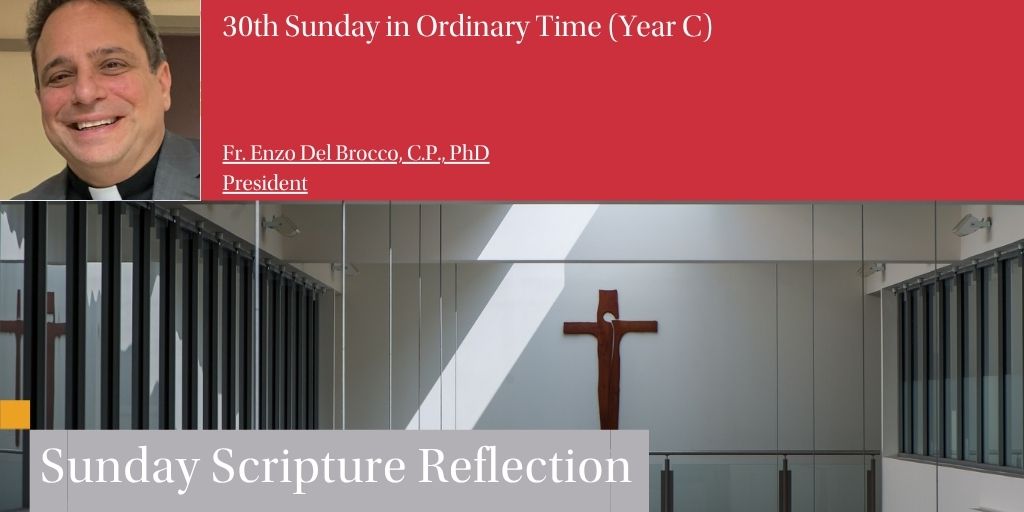

President
Readings:
Sirach 35:12-14, 16-18
Psalm 34:2-3, 17-18, 19, 23
2 Timothy 4:6-8, 16-18
Luke 18:9-14
“From Comparison to Compassion”
The Word of God this Sunday leads us into the intimate space of prayer, where we stand before the One who sees us as we truly are. There is no need to hide, to put on masks, to perform, or to prove anything. In His presence, we can simply be. And in that simplicity — in the quiet truth of who we are — we begin to feel and understand more deeply how much He loves us.
In the Gospel, two men go up to the Temple to pray: one a Pharisee, the other a tax collector. Both approach the same God, both speak words of prayer, but only one truly encounters the Lord. The Pharisee’s prayer begins well — “I thank you, God” — but quickly turns into a speech about himself. His words, though addressed to God, circle back to his own achievements: “I fast twice a week; I pay tithes on all I possess.” His thanksgiving becomes self-praise, and his gaze turns toward those he considers inferior: “I thank you that I am not like the rest of humanity — greedy, dishonest, adulterous — or even like this tax collector.”
His self-celebration blinds him. It becomes a wall between him and the God he claims to worship. When prayer turns inward, it ceases to be prayer — it becomes a mirror for self-admiration instead of a window opening toward divine mercy. Like Narcissus, the Pharisee bends over the waters of his own virtue and becomes captivated by his reflection until he drowns in it. He loses the capacity to look up, to look beyond, to see another face — and so he cuts himself off from both God and neighbor.
This is the tragedy of spiritual narcissism: it suffocates relationship. The Pharisee still speaks the language of faith, but it has become empty because it no longer opens him to love. He has forgotten that to be human is to be in relation. Emmanuel Levinas reminds us that “the self is not alone, but in its responsibility for the other.” Faith, then, is not an enclosure but an opening — an opening to God and to every other person who bears His image.
Martin Buber expressed the same truth in simpler yet profound words: “In the beginning is the relation.” The Pharisee’s error is precisely to replace this living I–Thou relationship with an I–It stance — treating others as objects for comparison rather than persons to love. In doing so, he breaks the very connection that gives life meaning. He prays, but his prayer cannot breathe; he believes, but his faith has no warmth. Like Narcissus, he gazes into himself and drowns — not in water, but in isolation.
When religion becomes self-referential, it dies; when it becomes relational, it gives life. The Gospel reminds us that we meet God not in self-exaltation but in encounter — in the humble recognition that our salvation lies not in proving ourselves righteous, but in letting mercy bind us once more to God and to one another.
In contrast, the tax collector stands far off, unable even to lift his eyes. His prayer is disarmingly simple: “God, be merciful to me, a sinner.” He does not compare, excuse, or justify. He simply opens his heart to grace. And because he dares to be real, he goes home reconciled and renewed. His humility does not humiliate him; it heals him.
Sirach reminds us that “the prayer of the humble pierces the clouds.” God listens to the cry that rises from truth. The psalm echoes the same conviction: “The Lord hears the cry of the poor.” Poverty of spirit is not misery — it is freedom, the freedom to need God, to stop performing and simply receive.
Saint Paul, nearing the end of his life, can say, “I have fought the good fight, I have kept the faith.” Yet even this is not self-glorification. His confidence rests not in his own strength but in the God who has sustained him. True humility, for Paul, is truth — the recognition that all good is grace.
The readings this Sunday lead us from comparison to compassion, from pride to mercy, from isolation to relationship. They remind us that to pray is not to list our virtues but to open our hearts; not to judge others but to welcome grace; not to exalt ourselves, but to allow God to lift us up.
So as we stand before the Lord today, there is no need to pretend. He knows us completely and loves us still. In that freedom, we can make the simplest and truest prayer: “God, be merciful to me, a sinner.” From those few words flow humility, peace, and compassion — the fruit of knowing that all of us, without exception, are children of the same merciful Father.
Amen.
Fr. Enzo Del Brocco, C.P., PhD
President